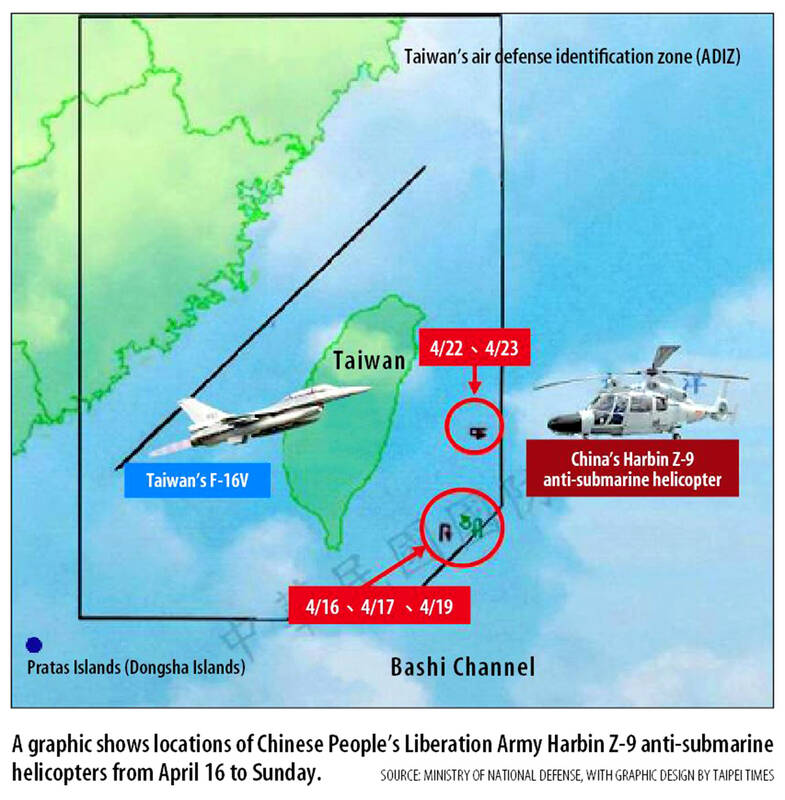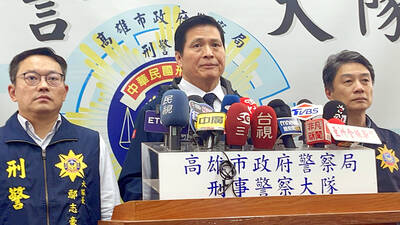The nation must improve its maritime surveillance capabilities, as China might be planning to impose an “underwater denial zone” to stymie submarine activity, a military expert said on Sunday.
In the eight days between April 16 and Sunday, the Ministry of National Defense detected five incursions by Chinese People’s Liberation Army (PLA) Harbin Z-9 anti-submarine helicopters east and southeast of the nation’s air defense identification zone.
On Sunday, Monday and Wednesday last week, they were found southeast of the nation, then on Saturday and Sunday operated further north above the waters east of Hualien County.

The Harbin Z-9 might have been operated by a Type 054A frigate stationed nearby, the main anti-submarine ship in the PLA fleet, Institute of National Defense and Security Research fellow Su Tzu-yun (蘇紫雲) said.
Unlike the shallow basins to the nation’s west and southwest, the oceanic terrain off the east coast is complex, composed of ridges, trenches and basins, Su said.
The area has therefore become a hotspot for surveillance conducted by PLA anti-submarine aircraft, he said.
The information found on these missions would be valuable for PLA submarines to predict the movements of Taiwanese submarines, he said.
Asked why the PLA has been ramping up helicopter activity, Su said it might be related to naval training, as sea conditions are optimal in mid-to-late April.
It could also be an acceleration of operations east of Taiwan, as the PLA might be aiming to turn the waters to the east and southwest into “underwater denial zones,” he said.
The experience of the operating frigates could also be used as reference for larger amphibious ships in advance assessments for transport and attack helicopter missions, he said.
As an island nation, Taiwan has not invested enough into surveying its surrounding waters, Su said.
The data could be useful not just for military purposes, but also for the marine economy and fishing industry, he said.
If the nation improves its maritime surveillance capabilities, it could also assist strategic cooperation with like-minded partners, he added.
In related news, Premier Chen Chien-jen (陳建仁) yesterday said that Taiwan has no plan to arm its citizens, in response to a proposal by a US presidential candidate earlier this month to “put a gun in every Taiwanese household.”
Entrepreneur Vivek Ramaswamy made the comment on April 14 at an annual National Rifle Association (NRA) gathering in Indianapolis, Indiana.
“You want China not to invade Taiwan? Here is something we can do: The NRA can open its branch next time in Taiwan,” the Republican candidate said. “And you want to stop [Chinese President] Xi Jinping (習近平) from invading Taiwan, put a gun in every Taiwanese household, have them defend themselves. Let’s see what Xi Jinping does then.”
The international community has always been concerned with maintaining peace in the region and in the Taiwan Strait, Chen told reporters at an event in Taichung.
Suggestions such as Ramaswamy’s are made in the hopes of instilling a defensive mindset among Taiwanese, “but the situations are different in Taiwan and the US,” he said.
“We do not have any such plan,” Chen added.
The idea of keeping emergency stockpiles of weapons is being discussed, but Taiwan must have an autonomous defense force, he said.
Additional reporting by Hsu Kuo-chen

Twenty-four Republican members of the US House of Representatives yesterday introduced a concurrent resolution calling on the US government to abolish the “one China” policy and restore formal diplomatic relations with Taiwan. Led by US representatives Tom Tiffany and Scott Perry, the resolution calls for not only re-establishing formal relations, but also urges the US Trade Representative to negotiate a free-trade agreement (FTA) with Taiwan and for US officials to advocate for Taiwan’s full membership in the UN and other international organizations. In a news release announcing the resolution, Tiffany, who represents a Wisconsin district, called the “one China” policy “outdated, counterproductive

Actress Barbie Hsu (徐熙媛) has “returned home” to Taiwan, and there are no plans to hold a funeral for the TV star who died in Japan from influenza- induced pneumonia, her family said in a statement Wednesday night. The statement was released after local media outlets reported that Barbie Hsu’s ashes were brought back Taiwan on board a private jet, which arrived at Taipei Songshan Airport around 3 p.m. on Wednesday. To the reporters waiting at the airport, the statement issued by the family read “(we) appreciate friends working in the media for waiting in the cold weather.” “She has safely returned home.

ON PAROLE: The 73-year-old suspect has a criminal record of rape committed when he was serving in the military, as well as robbery and theft, police said The Kaohsiung District Court yesterday approved the detention of a 73-year-old man for allegedly murdering three women. The suspect, surnamed Chang (張), was arrested on Wednesday evening in connection with the death of a 71-year-old woman surnamed Chao (趙). The Kaohsiung City Police Department yesterday also unveiled the identities of two other possible victims in the serial killing case, a 75-year-old woman surnamed Huang (黃), the suspect’s sister-in-law, and a 75-year-old woman surnamed Chang (張), who is not related to the suspect. The case came to light when Chao disappeared after taking the suspect back to his residence on Sunday. Police, upon reviewing CCTV

TRUMP ERA: The change has sparked speculation on whether it was related to the new US president’s plan to dismiss more than 1,000 Joe Biden-era appointees The US government has declined to comment on a post that indicated the departure of Laura Rosenberger as chair of the American Institute in Taiwan (AIT). Neither the US Department of State nor the AIT has responded to the Central News Agency’s questions on the matter, after Rosenberger was listed as a former chair on the AIT’s official Web site, with her tenure marked as 2023 to this year. US officials have said previously that they usually do not comment on personnel changes within the government. Rosenberger was appointed head of the AIT in 2023, during the administration of former US president Joe